情态动词用法总结
情态动词主要用法总结

情态动词主要用法总结情态动词是用来表示说话人的态度、情感或意愿的动词。
情态动词有can、could、may、might、shall、should、will、would、must、need 等。
以下是情态动词的主要用法总结:1.表示能力:- Can:表示一般的能力或技能,意为“能够”。
- Could:表示过去的能力或技能,意为“能够”。
2.表示许可或允许:- Can:表示一般的许可或允许,意为“可以”。
- May:表示正式的或礼貌的许可,意为“可以”。
3.表示可能性:- May:表示可能性较大,意为“可能”。
- Might:表示可能性较小,意为“可能”。
4.表示意愿或请求:- Shall:用于第一人称中,表示提议、请求或建议,意为“将”。
- Should:用于第一人称或第三人称中,表示忠告、建议或期望,意为“应该”。
- Will:用于第一人称和第三人称中,表示意愿、决心或承诺,意为“将”。
- Would:用于第一人称和第三人称中,表示客气的请求、建议或愿望,意为“将”。
5.表示必要性或推测:- Must:表示必须性或应该性,意为“必须”。
- Should:表示推测、猜测或可能性较大的必要性,意为“应该”。
6.表示时间或条件:- Will/Would:表示未来时间或条件,意为“将/将会”。
7.表示推测或假设:- Must:表示肯定的推测,意为“一定”。
- May/Might:表示可能的推测,意为“可能”。
需要注意的是,情态动词本身没有人称和数的变化,后面的动词应为原形。
另外,他们常常与动词的原形连用构成谓语,可以用于各种句型,例如肯定句、否定句、疑问句等。
情态动词用法总结

情态动词用法总结情态动词,又称情态助动词,是英语中一类特殊的助动词,包括can、could、may、might、must、shall、should、will、would等。
它们通常与动词原形搭配使用,用来表示说话人对动作或状态的态度、推测、许可、义务、建议等。
下面将分别从这几个方面进行总结情态动词的用法。
1. 表示能力和才能:can、could和able to都可以表示能力和才能,但用法稍有不同。
can和able to可以用来表示现在或将来的能力,而could则表示过去的能力或偶然的能力。
例如:- I can swim.(我会游泳)- She could speak three languages when she was 15.(她15岁时会说三种语言)- He was able to finish the task on time.(他能够按时完成任务)2. 表示推测和可能性:may、might和could可用来表示推测和可能性,其中may比might更常用,could表示可能性最低。
例如:- He may be at home.(他可能在家)- It might rain this afternoon.(今天下午可能会下雨)- She could be in the library.(她有可能在图书馆)3. 表示许可和禁止:can、could和may可用来表示许可,could表示客气一些。
而mustn't则表示禁止。
例如:- You can go now.(你可以走了)- Could I use your computer?(我能用一下你的电脑吗?)- You mustn't smoke here.(你不能在这里抽烟)4. 表示义务和必要性:must表示主观上的义务和必要性,常用来表示说话人的主观判断。
have to则表示客观上的必要性和强制性。
例如:- I must finish my homework tonight.(我必须今晚完成作业)- I have to get up early tomorrow.(我明天必须早起)5. 表示建议和推荐:should和ought to都表示建议或推荐,should更常用一些,ought to用得相对较少。
情态动词用法归纳总结
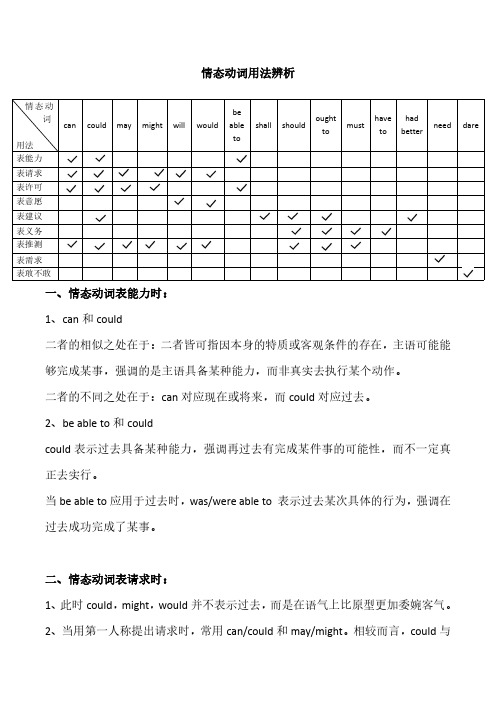
情态动词用法辨析情态动词用法can could may might will would be able to shall should ought to must have to had better need dare表能力表请求表许可表意愿表建议表义务表推测表需求表敢不敢一、情态动词表能力时:1、can 和could二者的相似之处在于:二者皆可指因本身的特质或客观条件的存在,主语可能能够完成某事,强调的是主语具备某种能力,而非真实去执行某个动作。
二者的不同之处在于:can 对应现在或将来,而could 对应过去。
2、be able to 和couldcould 表示过去具备某种能力,强调再过去有完成某件事的可能性,而不一定真正去实行。
当be able to 应用于过去时,was/were able to 表示过去某次具体的行为,强调在过去成功完成了某事。
二、情态动词表请求时:1、此时could ,might ,would 并不表示过去,而是在语气上比原型更加委婉客气。
2、当用第一人称提出请求时,常用can/could 和may/might 。
相较而言,could 与may在表请求的问句中出现的频率最高;might表发请求的语气最为委婉客气,因此反而很少见;而can则常用于熟人间的对话中。
语气强度:can>could/might>might3、当用第二人称提出请求时,常用can/could和will/would。
其中could和would 表达请求的语气更委婉客气;而can与will则常用于熟人对话中。
语气强度:can/will>could/would三、情态动词表许可时:1、与表请求不同,will/would不论前接第几人称,都表示主语本身的意愿,无需得到他人的“许可”,所以will/would不可以用于表请求的句中。
2、can和may二者都可以表示对现在或将来动作的许可,其中can的使用频率更高。
情态动词的用法总结归纳表
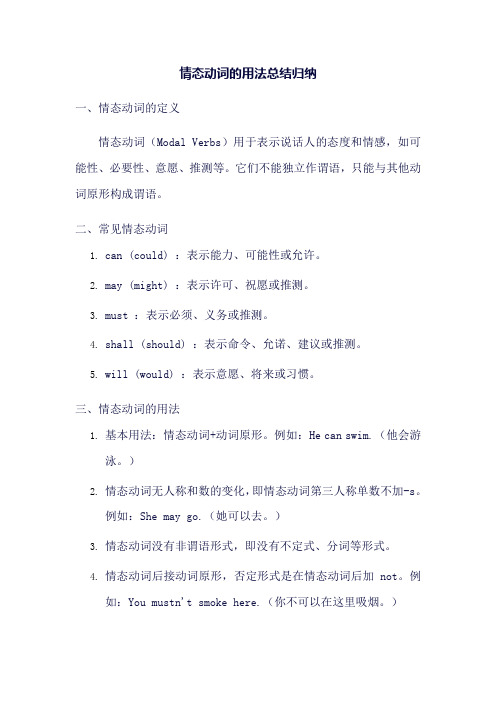
情态动词的用法总结归纳一、情态动词的定义情态动词(Modal Verbs)用于表示说话人的态度和情感,如可能性、必要性、意愿、推测等。
它们不能独立作谓语,只能与其他动词原形构成谓语。
二、常见情态动词1.can (could) :表示能力、可能性或允许。
2.may (might) :表示许可、祝愿或推测。
3.must :表示必须、义务或推测。
4.shall (should) :表示命令、允诺、建议或推测。
5.will (would) :表示意愿、将来或习惯。
三、情态动词的用法1.基本用法:情态动词+动词原形。
例如:He can swim.(他会游泳。
)2.情态动词无人称和数的变化,即情态动词第三人称单数不加-s。
例如:She may go.(她可以去。
)3.情态动词没有非谓语形式,即没有不定式、分词等形式。
4.情态动词后接动词原形,否定形式是在情态动词后加not。
例如:You mustn't smoke here.(你不可以在这里吸烟。
)5.带有情态动词的疑问句和否定句变换只需将情态动词提到主语前或直接在情态动词后加not。
例如:Can he dance?(他会跳舞吗?)He can't dance.(他不会跳舞。
)6.情态动词可以表示推测和可能性。
例如:It may rain tomorrow.(明天可能会下雨。
)7.情态动词可以表示命令和建议。
例如:You should study hard.(你应该努力学习。
)8.情态动词可以表示习惯和规律。
例如:He will arrive at nine.(他将在九点到达。
)9.情态动词可以与完成时连用,表示对过去的推测和猜测。
例如:She may have gone to the cinema.(她可能去看电影了。
)10.情态动词可以与进行时连用,表示对现在的推测和猜测。
例如:He must be studying in the classroom.(他一定在教室里学习。
情态动词用法归纳(全)
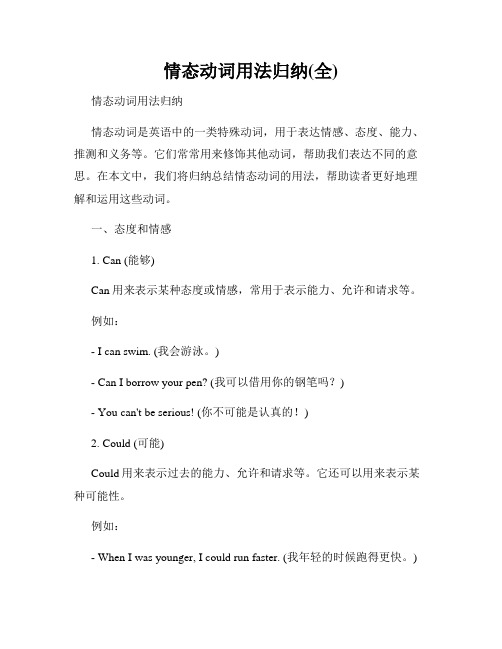
情态动词用法归纳(全)情态动词用法归纳情态动词是英语中的一类特殊动词,用于表达情感、态度、能力、推测和义务等。
它们常常用来修饰其他动词,帮助我们表达不同的意思。
在本文中,我们将归纳总结情态动词的用法,帮助读者更好地理解和运用这些动词。
一、态度和情感1. Can (能够)Can用来表示某种态度或情感,常用于表示能力、允许和请求等。
例如:- I can swim. (我会游泳。
)- Can I borrow your pen? (我可以借用你的钢笔吗?)- You can't be serious! (你不可能是认真的!)2. Could (可能)Could用来表示过去的能力、允许和请求等。
它还可以用来表示某种可能性。
例如:- When I was younger, I could run faster. (我年轻的时候跑得更快。
)- Could I ask you a question? (我可以问你一个问题吗?)- It could rain later, so bring an umbrella. (今天后面可能会下雨,所以带上雨伞。
)3. May (可能)May常表示许可、请求和推测等。
它还可以用来表示某种可能性或希望。
例如:- May I use your phone? (我可以用一下你的手机吗?)- It may rain tomorrow. (明天可能会下雨。
)- They may arrive late. (他们可能会迟到。
)4. Might (可能)Might与may的用法类似,但表示的可能性稍微低一些。
例如:- She might be busy. (她可能很忙。
)- I might go to the party, but I'm not sure yet. (我可能会去参加派对,但我还不确定。
)二、能力和推测1. Must (必须)Must用来表示强烈的推断或必要性。
情态动词的用法总结表格

情态动词的用法总结表格|情态动词|用法|例句||||||can|表示能力,“能,会”|I can swim 我会游泳。
|||表示许可,“可以”|You can go now 你现在可以走了。
|||表示可能性,“可能”|It can be very cold in winter 冬天可能会很冷。
||could|can 的过去式,表示过去的能力|I could ride a bike when I was five 我五岁时就能骑自行车。
|||could 可用于委婉地提出请求、建议等|Could you please help me? 您能帮我一下吗?||may|表示许可或请求许可,“可以”|May I come in? 我可以进来吗?|||表示可能性,“也许,可能”|It may rain tomorrow 明天可能下雨。
||might|may 的过去式|He said that he might come 他说他可能来。
|||用于可能性较小的推测|She might be at home 她也许在家。
||must|表示必须,强调主观上的“必须”|You must finish your homework 你必须完成作业。
|||表示肯定的推测,“一定”|He must be very tired 他一定很累了。
||have to|表示客观上的“不得不”|I have to go now 我现在得走了。
|||有人称、数和时态的变化|She has to do a lot of housework 她不得不做很多家务。
||should|表示应该,常用来提出建议|You should study hard 你应该努力学习。
|||表示推测,“应该”|They should be there by now 他们现在应该到那儿了。
||ought to|同 should ,表示应该|You ought to listen to your parents 你应该听你父母的话。
情态动词全部知识点总结
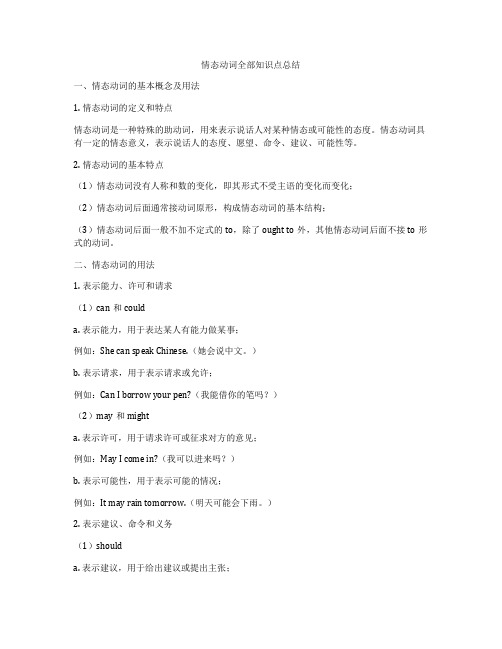
情态动词全部知识点总结一、情态动词的基本概念及用法1. 情态动词的定义和特点情态动词是一种特殊的助动词,用来表示说话人对某种情态或可能性的态度。
情态动词具有一定的情态意义,表示说话人的态度、愿望、命令、建议、可能性等。
2. 情态动词的基本特点(1)情态动词没有人称和数的变化,即其形式不受主语的变化而变化;(2)情态动词后面通常接动词原形,构成情态动词的基本结构;(3)情态动词后面一般不加不定式的to,除了ought to外,其他情态动词后面不接to形式的动词。
二、情态动词的用法1. 表示能力、许可和请求(1)can和coulda. 表示能力,用于表达某人有能力做某事;例如:She can speak Chinese.(她会说中文。
)b. 表示请求,用于表示请求或允许;例如:Can I borrow your pen?(我能借你的笔吗?)(2)may和mighta. 表示许可,用于请求许可或征求对方的意见;例如:May I come in?(我可以进来吗?)b. 表示可能性,用于表示可能的情况;例如:It may rain tomorrow.(明天可能会下雨。
)2. 表示建议、命令和义务(1)shoulda. 表示建议,用于给出建议或提出主张;例如:You should see a doctor.(你应该去看医生。
)b. 表示义务,用于表示责任或义务;例如:We should obey the law.(我们应该遵守法律。
)(2)ought toa. 表示责任或义务,用于表示应该做的事情;例如:You ought to apologize to her.(你应该向她道歉。
)3. 表示可能性和必然性(1)musta. 表示必然性,用于表示肯定的推断或必然的结论;例如:He must be at home now.(他现在一定在家。
)b. 表示义务,用于表示应遵守的规定或责任;例如:Students must wear school uniforms.(学生必须穿校服。
情态动词的用法
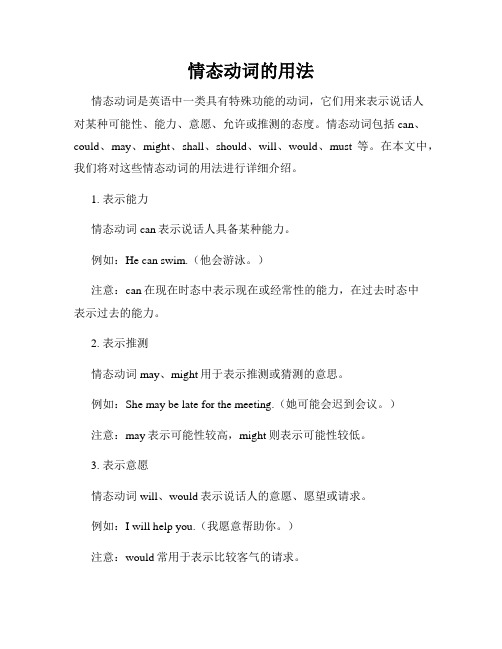
情态动词的用法情态动词是英语中一类具有特殊功能的动词,它们用来表示说话人对某种可能性、能力、意愿、允许或推测的态度。
情态动词包括can、could、may、might、shall、should、will、would、must等。
在本文中,我们将对这些情态动词的用法进行详细介绍。
1. 表示能力情态动词can表示说话人具备某种能力。
例如:He can swim.(他会游泳。
)注意:can在现在时态中表示现在或经常性的能力,在过去时态中表示过去的能力。
2. 表示推测情态动词may、might用于表示推测或猜测的意思。
例如:She may be late for the meeting.(她可能会迟到会议。
)注意:may表示可能性较高,might则表示可能性较低。
3. 表示意愿情态动词will、would表示说话人的意愿、愿望或请求。
例如:I will help you.(我愿意帮助你。
)注意:would常用于表示比较客气的请求。
4. 表示推测的过去情态动词must常用于表示对过去情况的推测或肯定。
例如:He must have missed the bus.(他肯定错过了公交车。
)注意:must用于表示对过去情况的肯定,而might用于表示对过去情况的推测。
5. 表示义务或必要性情态动词must表示对义务、必要性或确定性的肯定。
例如:You must finish your homework.(你必须完成作业。
)6. 表示建议或应该情态动词should表示建议或应该。
例如:You should go to bed early.(你应该早点睡觉。
)注意:should还可以表示对过去情况的推测,例如:He should have arrived by now.(他现在应该已经到达了。
)7. 表示允许或许可情态动词can与may可以用于表示许可或允许。
例如:Can I borrow your pen?(我可以借你的钢笔吗?)8. 表示可能性情态动词could用于表示可能性。
情态动词用法归纳全

I’ll not be able to come this afternoon. 当表示“经过努力才得以做成功某事”时应用be able to
,不能用Can。如:
He was able to go to the party yesterday evening in spite of the heavy rain.
flowers. 2) need 作情态动词用时, 常用于疑问句、否定句。在肯定句中一般用
must, have to, ought to, should代替。 1. You needn’t come so early.
2. ---- Need I finish the work today? ---- Yes, you must. / No, you needn’t.
表示劝告、建议
had better 意为 “最好”, 表示建议
used to 意为 “过去常常, 表示过去 的动作、行为
考点一 can , may, must 等情态动词在陈述句中的用法
1. can 的用法
(3)表示许可,常在口语中。如:
(1)表示能力、许可、可能性。 表示 能力时一般译为“能、会”, 即有种 能力,尤其是生来具备的能力,此 时may 和must 均不可代替它。如:
You must stay here until I come back.在我回来之前你必须呆在这儿。
Must I hand in my homework right now? 我必须现在交作业吗?
六、 will, would
• 3) would表示过去反复发生的动作或某种倾向。would表示过去习惯时 比used to正式, 且没有“现已无此习惯”的含义。
情态动词的用法总结及例句解析
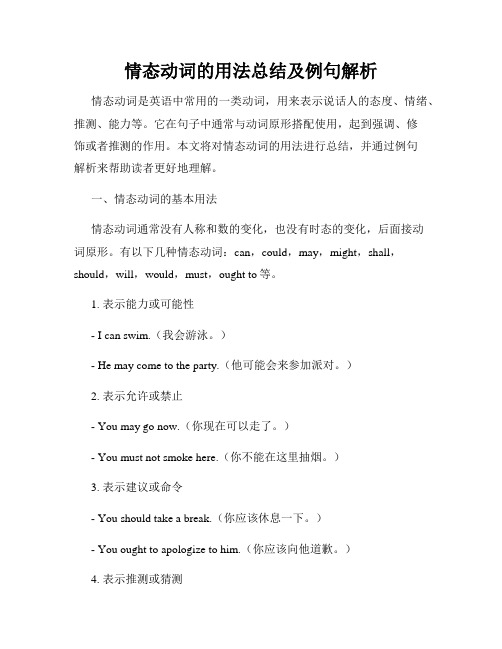
情态动词的用法总结及例句解析情态动词是英语中常用的一类动词,用来表示说话人的态度、情绪、推测、能力等。
它在句子中通常与动词原形搭配使用,起到强调、修饰或者推测的作用。
本文将对情态动词的用法进行总结,并通过例句解析来帮助读者更好地理解。
一、情态动词的基本用法情态动词通常没有人称和数的变化,也没有时态的变化,后面接动词原形。
有以下几种情态动词:can,could,may,might,shall,should,will,would,must,ought to等。
1. 表示能力或可能性- I can swim.(我会游泳。
)- He may come to the party.(他可能会来参加派对。
)2. 表示允许或禁止- You may go now.(你现在可以走了。
)- You must not smoke here.(你不能在这里抽烟。
)3. 表示建议或命令- You should take a break.(你应该休息一下。
)- You ought to apologize to him.(你应该向他道歉。
)4. 表示推测或猜测- He could be there.(他可能在那里。
)- It might rain tomorrow.(明天可能会下雨。
)5. 表示义务或必须- We must finish the project on time.(我们必须按时完成这个项目。
)- You ought to help him.(你应该帮助他。
)二、情态动词的细分用法除了以上的基本用法外,情态动词还有一些特殊的用法,需要注意其具体含义和用法。
1. can 和 could- 表示能力和技能:I can play the piano.(我会弹钢琴。
)- 表示请求或许可:Can I use your computer?(我可以用你的电脑吗?)- could 还可以用来表示过去的能力或许可:When I was young, I could run very fast.(小时候,我跑得很快。
情态动词用法归纳总结

情态动词用法归纳总结情态动词是一类用来表示说话人的态度、观点和意愿的动词,具有一定的语法特点。
以下是情态动词的一些常见用法归纳总结:1.表示能力、可能性和推测:- Can: 表示能力和可能性,用于肯定句;例如:“I can swim.”(我会游泳。
)- Could: 表示能力和可能性,用于疑问句和否定句;例如:“Could you help me?”(你能帮助我吗?)- May/might: 表示可能性和推测;例如:“He may be busy.”(他可能很忙。
)- Must: 表示强烈的推测或肯定;例如:“He must be tired.”(他一定很累。
)2.表示许可和建议:- Can: 表示允许和禁止,用于肯定句;例如:“You can go now.”(你现在可以走了。
)- Could: 表示请求允许,用于疑问句和否定句;例如:“Could I borrow your pen?”(我可以借用你的笔吗?)- May/might: 表示请求允许;例如:“May I use your phone?”(我可以用一下你的手机吗?)- Should: 表示建议;例如:“You should eat more vegetables.”(你应该多吃蔬菜。
)3.表示义务和推测:- Must: 表示必须和义务;例如:“You must finish your homework.”(你必须完成作业。
)- Have to: 表示必须和义务;例如:“I have to go to work tomorrow.”(我明天必须去上班。
)4.表示可能性和意愿:- Can: 表示可能性和意愿,用于肯定句;例如:“I can help you with that.”(我可以帮你做那个。
)- Could: 表示可能性和意愿,用于疑问句和否定句;例如:“Could you please pass me the salt?”(请你把盐递给我好吗?)- May/might: 表示可能性和意愿;例如:“I may go to the party tonight.”(今晚我可能会去参加派对。
初中知识点归纳情态动词的特殊用法与句型转换
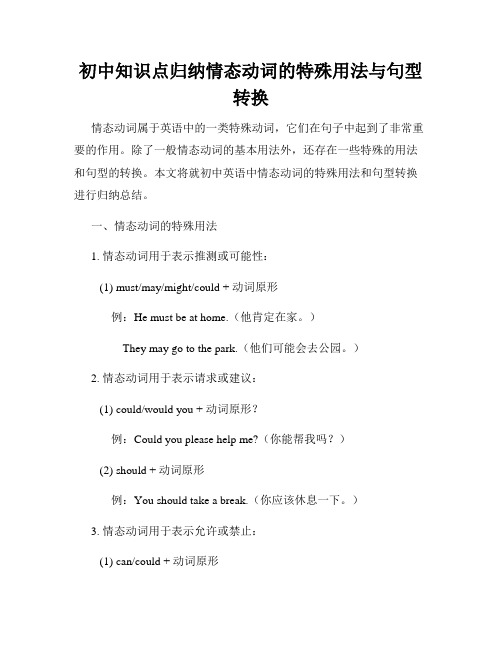
初中知识点归纳情态动词的特殊用法与句型转换情态动词属于英语中的一类特殊动词,它们在句子中起到了非常重要的作用。
除了一般情态动词的基本用法外,还存在一些特殊的用法和句型的转换。
本文将就初中英语中情态动词的特殊用法和句型转换进行归纳总结。
一、情态动词的特殊用法1. 情态动词用于表示推测或可能性:(1) must/may/might/could + 动词原形例:He must be at home.(他肯定在家。
)They may go to the park.(他们可能会去公园。
)2. 情态动词用于表示请求或建议:(1) could/would you + 动词原形?例:Could you please help me?(你能帮我吗?)(2) should + 动词原形例:You should take a break.(你应该休息一下。
)3. 情态动词用于表示允许或禁止:(1) can/could + 动词原形例:You can go now.(你可以走了。
)(2) must/mustn't + 动词原形例:You must finish your homework.(你必须完成作业。
)4. 情态动词用于表示能力或可能性:(1) can/could + 动词原形例:She can swim very well.(她游泳游得很好。
)(2) be able to + 动词原形例:He will be able to speak English fluently.(他将能够流利地说英语。
)5. 情态动词用于表示意愿或命令:(1) will/would + 动词原形例:I will do my best.(我会尽力的。
)(2) shall/should + 动词原形例:You shall obey the rules.(你应该遵守规则。
)二、句型转换1. 肯定句转否定句:将情态动词的原形后加上not。
情态动词用法归纳

情态动词用法归纳一、引言(一)情态动词的定义和分类(二)情态动词的基本用法和特点二、情态动词的具体用法(一)can 和 could 的用法 1. 表示能力 2. 表示可能性 3. 表示请求和允许 4. 表示推测 5. could 的其他用法(二)may 和 might 的用法 1. 表示可能性 2. 表示请求和允许 3. 表示祝愿 4. might 的其他用法(三)must 和 have to 的用法 1. 表示必须 2. 表示推测 3. have to 的其他用法(四)should 和 ought to 的用法 1. 表示应该 2. 表示推测 3. 表示建议 4. 表示责任和义务(五)will 和 would 的用法 1. 表示意愿 2. 表示请求和邀请 3. 表示习惯和倾向性 4. 表示推测 5. would 的其他用法(六)shall 的用法 1. 用于第一人称表示将来 2. 用于第二、三人称表示命令、警告、允诺等 3. 用于征求意见(七)need 的用法 1. 作为情态动词的用法 2. 作为实义动词的用法(八)dare 的用法 1. 作为情态动词的用法 2. 作为实义动词的用法三、情态动词的时态和语态(一)情态动词的时态 1. 一般现在时 2. 一般过去时 3. 现在进行时 4. 过去进行时 5. 现在完成时 6. 过去完成时(二)情态动词的语态 1. 主动语态 2. 被动语态四、情态动词的否定形式和疑问形式(一)情态动词的否定形式 1. 直接在情态动词后加 not 2. 用情态动词的缩写形式加 not (二)情态动词的疑问形式 1. 将情态动词提前 2. 用情态动词的缩写形式提前五、情态动词的特殊用法(一)情态动词与其他动词的搭配 1. 情态动词+动词原形 2. 情态动词+be+形容词/名词3. 情态动词+have+过去分词(二)情态动词的省略 1. 在口语中,某些情态动词可以省略 2. 在某些情况下,情态动词的后面可以省略动词原形(三)情态动词的强调 1. 通过重读情态动词来强调 2. 使用 do/does/did 来强调六、情态动词的比较和区别(一)can 和 be able to 的区别 1. 表示能力时的区别 2. 时态和语态的区别(二)may 和 might 的区别 1. 表示可能性时的区别 2. 表示请求和允许时的区别(三)must 和 have to 的区别 1. 表示必须时的区别 2. 时态和语态的区别(四)should 和 ought to 的区别 1. 表示应该时的区别 2. 语气上的区别(五)will 和 would 的区别 1. 表示意愿时的区别 2. 表示习惯和倾向性时的区别(六)shall 和 will 的区别 1. 用于第一人称时的区别 2. 用于第二、三人称时的区别七、情态动词的练习和应用(一)情态动词的练习题 1. 选择题 2. 填空题 3. 改错题 4. 翻译题(二)情态动词的应用场景 1. 日常生活中的应用 2. 商务场合中的应用 3. 学术写作中的应用八、结论(一)情态动词的重要性和作用(二)情态动词的用法归纳和总结(三)对情态动词的进一步学习和研究的展望。
英语情态动词用法的完整总结与解释
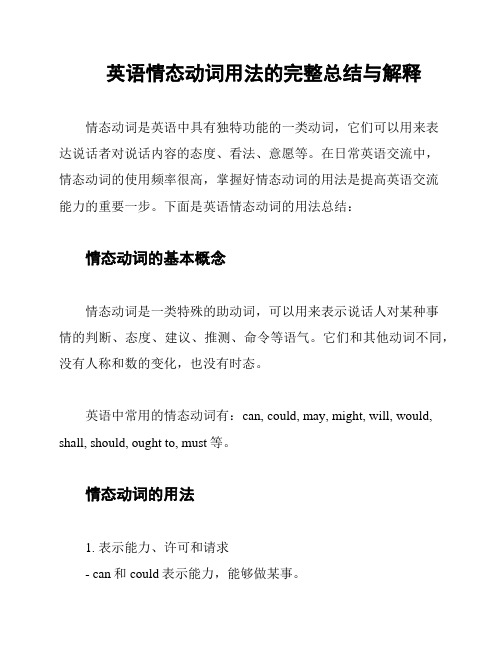
英语情态动词用法的完整总结与解释情态动词是英语中具有独特功能的一类动词,它们可以用来表达说话者对说话内容的态度、看法、意愿等。
在日常英语交流中,情态动词的使用频率很高,掌握好情态动词的用法是提高英语交流能力的重要一步。
下面是英语情态动词的用法总结:情态动词的基本概念情态动词是一类特殊的助动词,可以用来表示说话人对某种事情的判断、态度、建议、推测、命令等语气。
它们和其他动词不同,没有人称和数的变化,也没有时态。
英语中常用的情态动词有:can, could, may, might, will, would, shall, should, ought to, must等。
情态动词的用法1. 表示能力、许可和请求- can和could表示能力,能够做某事。
- He can swim.(他会游泳。
)- may和might表示许可,允许或请求。
- May I use your pen?(我能用你的笔吗?)- would you mind和could you possibly表示请求,请求对方做某事。
- Would you mind closing the window?(你能帮我关一下窗户吗?)2. 表示推测、可能性和相信- may和might表示推测或可能性。
- I may be late for the meeting.(我可能会迟到开会。
)- must表示非常肯定或有把握。
- It must be cold outside.(外面一定很冷。
)3. 表示建议和义务- should和ought to表示应该,有义务。
- We should wash our hands before meals.(我们应该饭前洗手。
)- had better和would rather表示建议。
- You had better hurry up.(你最好快点。
)4. 表示命令和禁止- will和shall表示命令。
- You will leave a message.(你必须留言。
情态动词总结知识点归纳

情态动词总结知识点归纳情态动词的用法:1. 表示能力和可能性情态动词 can, could, may, might 表示能力和可能性。
例如:She can speak three languages. (她能说三种语言。
)It may rain later. (可能会下雨。
)I might go to the party if I finish my work in time. (如果我及时完成工作,我可能会去参加派对。
)2. 表示义务和必要性情态动词 must, have to 表示义务和必要性。
例如:You must finish your homework before you can go out to play. (你必须在外出玩之前完成作业。
)I have to study for my exams. (我必须为考试而学习。
)3. 表示推测和猜测情态动词 may, might, could 表示推测和猜测。
例如:He may be at home. (他可能在家。
)She might have forgotten about the meeting. (她可能忘记了会议。
)I think it could rain later. (我认为可能会下雨。
)4. 表示请求和建议情态动词 can, could, may, might, will, would, shall, should, ought to 表示请求和建议。
例如:Could you pass me the salt, please? (你能递给我盐吗?)You may want to consider studying abroad. (你可能会考虑出国留学。
)You should stop smoking. (你应该戒烟。
)5. 表示允许和禁止情态动词 can, could, may, might 表示允许,而情态动词 must, shall 表示禁止。
情态动词的用法总结
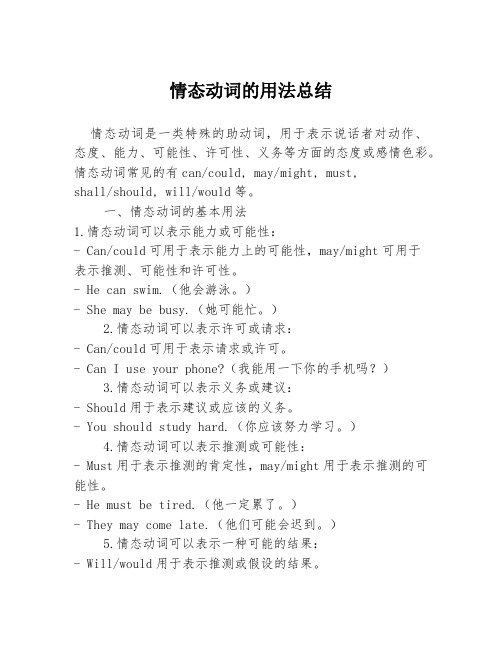
情态动词的用法总结情态动词是一类特殊的助动词,用于表示说话者对动作、态度、能力、可能性、许可性、义务等方面的态度或感情色彩。
情态动词常见的有can/could, may/might, must,shall/should, will/would等。
一、情态动词的基本用法1.情态动词可以表示能力或可能性:- Can/could可用于表示能力上的可能性,may/might可用于表示推测、可能性和许可性。
- He can swim.(他会游泳。
)- She may be busy.(她可能忙。
)2.情态动词可以表示许可或请求:- Can/could可用于表示请求或许可。
- Can I use your phone?(我能用一下你的手机吗?)3.情态动词可以表示义务或建议:- Should用于表示建议或应该的义务。
- You should study hard.(你应该努力学习。
)4.情态动词可以表示推测或可能性:- Must用于表示推测的肯定性,may/might用于表示推测的可能性。
- He must be tired.(他一定累了。
)- They may come late.(他们可能会迟到。
)5.情态动词可以表示一种可能的结果:- Will/would用于表示推测或假设的结果。
- If it rains, we will stay indoors.(如果下雨了,我们就呆在室内。
)二、情态动词的注意事项1.情态动词没有人称和数的变化,后面直接跟动词原形。
- He can play the piano.(他会弹钢琴。
)2.情态动词后面的动词一般用原形,表示动作和状态。
- I can swim.(我会游泳。
)- They should apologize.(他们应该道歉。
)3.情态动词用于疑问句时,直接将情态动词置于句首。
- Can you swim?(你会游泳吗?)4.情态动词用于否定句时,直接在情态动词前加"not"。
情态动词的用法总结

情态动词的用法总结情态动词是英语中一类特殊的动词,它们不表示动作,而是表示说话者对动作的态度,如肯定、否定、表示推测或可能性等。
在英语的语法结构中,情态动词占有重要的地位,并且在日常会话中比较常用。
下面就介绍一下情态动词的用法。
一、can的用法can最常见的用法是表示能力,即表示能够做某事,如:I can speak Chinese.我会说汉语。
也可以表示请求、允许或可能性,如:Can I borrow your pen?我可以借你的钢笔吗?Can we start the meeting now?我们现在可以开始开会吗?It can rain tomorrow.明天可能会下雨。
二、should的用法should表示建议、劝告或命令,如:You should read more books.你应该多读书。
You should not lie to your parents.你不应该对父母撒谎。
三、must的用法must表示必须,强调事情是不可以不做的,如:You must turn off the lights before leave the room.你离开房间之前必须关掉灯。
四、ought to的用法ought to相当于should,表示应该或建议,如:You ought to finish your homework before watching TV.你应该在看电视前把作业做完。
五、would的用法would常用来礼貌地表达请求、愿望或建议,如:Would you like a cup of tea?你想来杯茶吗?Would you like to go to the movies with me?你想和我一起看电影吗?六、could的用法could常用来表示可能性,也可以用来礼貌地表达请求,如: The weather could get worse later.天气以后可能会变得更糟糕。
情态动词的用法总结

情态动词的用法总结情态动词是一类特殊的动词,用来表示说话人对其中一种行为、状态或可能性的态度、判断、推测、愿望等情态。
情态动词有can,could,may,might,will,shall,should,would,must等。
它们在语法上有一些特殊的用法和用法限制。
以下是情态动词的用法总结:1.表示能力和许可:- Can/could:用来表示能力,做事的方式上拥有能力或技能。
例如:I can swim.(我会游泳。
)- May/might:用来表示允许或许可。
例如:May I go to the bathroom?(我可以去洗手间吗?)- Will/would:用来表示请求或许可。
例如:Would you please close the door?(你能关门吗?)2.表示推测和可能性:- May/might:用来表示推测、猜测或可能性。
例如:He may be at home.(他可能在家。
)- Could:用来表示一种可能性或假设的情况。
例如:He could bein the park.(他可能在公园。
)3.表示义务和必要性:- Must:用来表示义务、必要性或推测。
例如:You must finish your homework.(你必须完成作业。
)- Should:用来表示建议、责任或推测。
例如:You should apologize for your behavior.(你应该为你的行为道歉。
)4.表示愿望和偏好:- Would:用来表示过去或不太可能实现的愿望或偏好。
例如:I would love to go on vacation.(我很想去度假。
)需注意的是,情态动词具有一些特殊的用法和词语组合,例如情态动词后接动词原形、后接动词不定式的完成式形式等。
使用情态动词时需要根据具体语境和句子结构进行合理搭配与运用。
情态动词的用法和情态副词
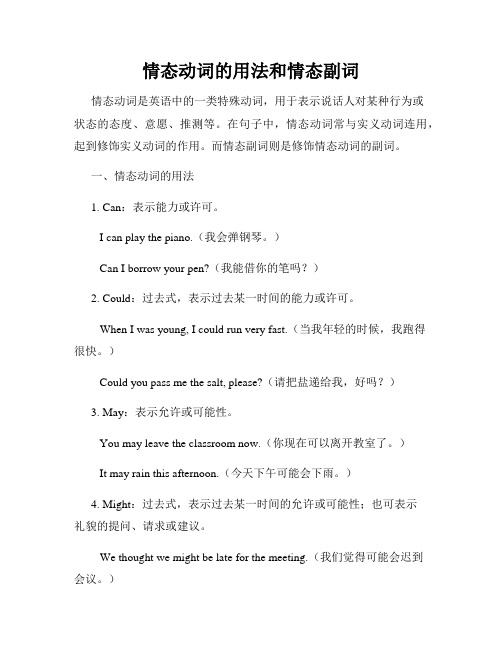
情态动词的用法和情态副词情态动词是英语中的一类特殊动词,用于表示说话人对某种行为或状态的态度、意愿、推测等。
在句子中,情态动词常与实义动词连用,起到修饰实义动词的作用。
而情态副词则是修饰情态动词的副词。
一、情态动词的用法1. Can:表示能力或许可。
I can play the piano.(我会弹钢琴。
)Can I borrow your pen?(我能借你的笔吗?)2. Could:过去式,表示过去某一时间的能力或许可。
When I was young, I could run very fast.(当我年轻的时候,我跑得很快。
)Could you pass me the salt, please?(请把盐递给我,好吗?)3. May:表示允许或可能性。
You may leave the classroom now.(你现在可以离开教室了。
)It may rain this afternoon.(今天下午可能会下雨。
)4. Might:过去式,表示过去某一时间的允许或可能性;也可表示礼貌的提问、请求或建议。
We thought we might be late for the meeting.(我们觉得可能会迟到会议。
)Might I ask you a question?(我可以问你一个问题吗?)5. Must:表示必须或肯定。
You must finish your homework before going out.(你必须在外出前完成作业。
)It must be cold outside.(外面肯定很冷。
)6. Should:表示应该或建议。
You should eat more fruits and vegetables.(你应该多吃水果和蔬菜。
)We should arrive at the airport early.(我们应该早点到机场。
)7. Would:表示过去意愿、假设、委婉的请求或建议。
- 1、下载文档前请自行甄别文档内容的完整性,平台不提供额外的编辑、内容补充、找答案等附加服务。
- 2、"仅部分预览"的文档,不可在线预览部分如存在完整性等问题,可反馈申请退款(可完整预览的文档不适用该条件!)。
- 3、如文档侵犯您的权益,请联系客服反馈,我们会尽快为您处理(人工客服工作时间:9:00-18:30)。
C. may D. must
6. ----Is Jack on duty today?
----It _C___ be him. It’s his turn tomorrow.
A. mustn’t B. won’t
C. can’t D. needn’t
7. It is usually warm in my hometown, but it _A___be rather
C. was able to D. could
a
7
2. may 与might
1. 表示“许可”或“请求”,有“可以”的意思,口语中 常用 might 代 may ,表示委婉语气。 否定回答时用“must not”表“禁止,阻止”, 不用 “may not”. “may not” 表示“可能不” 。
A. couldn’t have attended B. needn’t have attended
C. mustn’t have attended D. shouldn’t have attended
a
6
5. There’s someone outside. Who __A__it be?
A. can B. need
A. could have stayed
B. could stay
C. would stay
D. must have stayed
4. My sister met him at the Grand Theater yesterday
afternoon, so he __A__ your lecture.
4. may/ might as well + 动词原形 “…还是…的好” “不妨干某事”
Eg: You may as well go and have a look.
a
9
1.Sorry I'm late. I __A___ have turned off
the alarm clock and gone back to sleep again.
a
3
5) Could you lend me a hand?
4. can 用于疑问句或否定句中时,表惊异、 不相信等,意思是“可能、能够”。
6) How can you believe such a liar like him?
5. can’t/ couldn’t have done 表示对过去情况的否定推 测,意为“过去不可能做过某事”
而未做的事情感到惋惜,意为“本能够做某事可事实上
未9)做It”’s a pity. Your class could have got the first prize.
10)Where can Mary have goane?
4
can/be able to
can表示“能够”时与短语be able to同义, 但can只用于一般现在时或过去时,而后 者可用于各种时态。另外,can表示个人 有某种能力,而be able to表示某人通过努 力、克服困难做成某事,相当于succeed in doing sth.;
2) They said that they would help us.
3) No matter what I said, he won’t listen to me.
a
11
3.表示习惯性动作。 译作 “总是、惯于”, will 指现在 常常,would 指过去常常。
Eg: 1)This man is strange. He will sit for hours without saying anything.
cold sometimes.
A. can B. need
C. dare D. must
8. The fire spread through the hotel very quickly, but everyone ___C____ get away.
A. were able to B. would
a
1
情态动词的语法特征
1)情态动词表说话人的某种感情或语气,对 某一动作或状态的某种态度。
2) 情态动词不能单独做谓语, 后面只能接动词
原形,ought to和have to除外,。
3) 情态动词没有人称, 数的变化, 但有些情态 动词, 如can、will、have to、may等有过去式。
a
2
Eg: I should help her because she is in trouble. You ought to take care of the baby. Should I open the window? What should we do next?
2. 两者都可表示推测,表示很大的可能性。意为 “可 能、按理该…”
that he was late for the opening ceremony?
A. can B. should
C. may D. must
3. ---- I stayed at a hotel while in New York.
---- Oh, did you? You __A__ with Barbara.
2) Can she be in the computer center? 3) I though what he said could not be true.
3. 表示“请求” “允许”(表请求时,口语中常用 could 代替 can 使语气更委婉,回答时用can)
4) Can/Could I use your dictionary?
Eg: 1) The girl might be sleeping this time of day.
2) They may be in the library now.
a
8
3.may/might have done 表示对过去发生过的事情的推测, 意为“可能已经做过某事”
Eg: I can’t find my sunglasses. I may/might have left them in your office.
却干了
Eg: You should have invited me to the party yesterday. You are right. I Should have thought of that. You shouldn’t have eaten all the cakes in one day.
7) Susan can’t have written a report like this. 8) She can’t have gone to school, it is Sunday .
6. can/could have done表对过去的推测,意为“过去可
能做了某事”。 could have done还可以表示对过去能做
1. can 与could
1.表能力,意为“能,能够”,can指现在,could指过去。
1) Some of us can use the computer now, but we couldn’t last year.
2. 表示推测,意为“可能”“或许”,用于疑问句或 否定句,can’t和couldn’t意为“不可能”。
tomorrow afternoon. ---- They __B___ be ready by 12:00
A. can B. should
C. might D. need
c 3. We ______ last night, but we went to the concert instead.
A. must have studied B. might study
Eg: 1)--- May I watch TV after supper? --- Yes, you may. / No, you mustn’t. 2) Today is Sunday. She may not in her office now.
2. 表示可能性。 意为“或许,可能” might 比 may 可能性小。
Eg: 1)Will you lend me your book? 2) Would you like a cup of tea?
2. 用于表示意志或意愿,意为“会,愿意” 。will 指 现在,而 would 指 过去。用于否定句中,表示“不 会、不肯、不乐意”。
Eg: 1) I won’t do that again.
corner after work every day.
A. would B. should C. had better D. might
a
13
4. should与ought to
1. ought to比should语气更重。两者都用于表劝告、建议。 意为”应该、应当”。但在疑问句中常用should。ought to的否定式为oughtn’t to或ought not to。
2) Mary will keep asking some silly questions. 3) Every evening, she would sit by window,
deep in thought. 4) We would sit around Grandpa after supper, listening to his stories.
a
Hale Waihona Puke 121. If you __B__ wait here for another 5 minutes, our manager
will come back.
A. should B. will
C. need D. must
